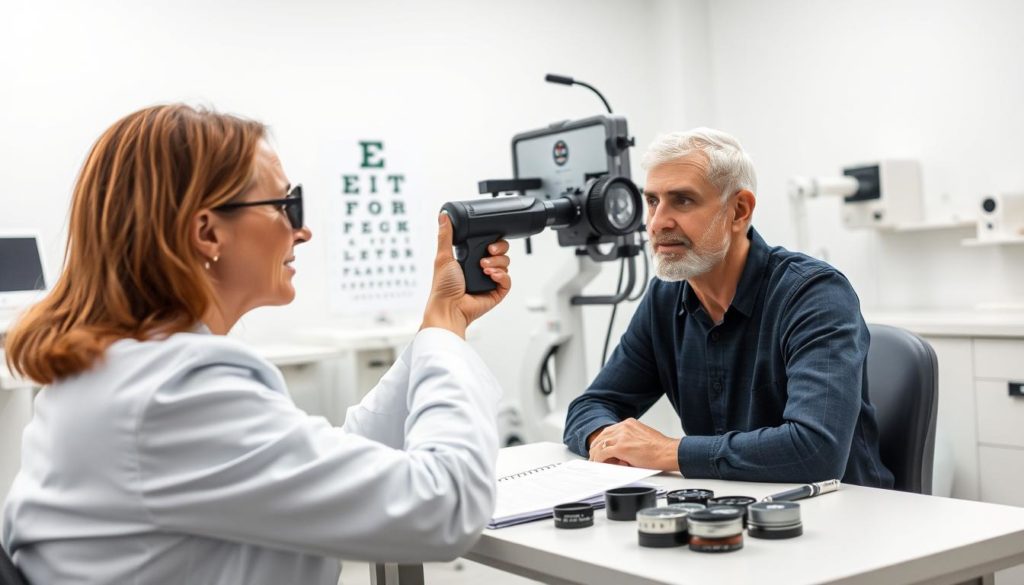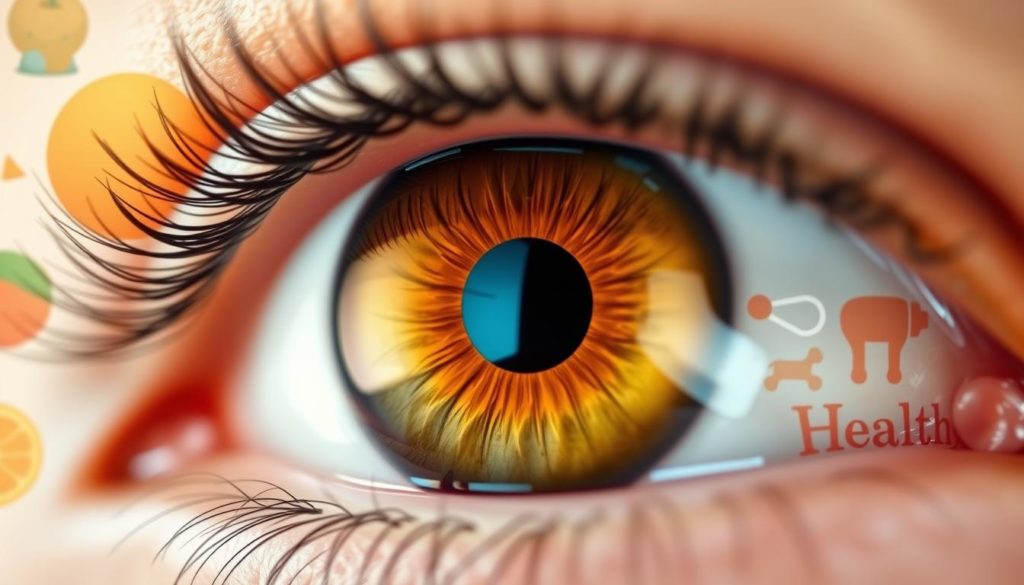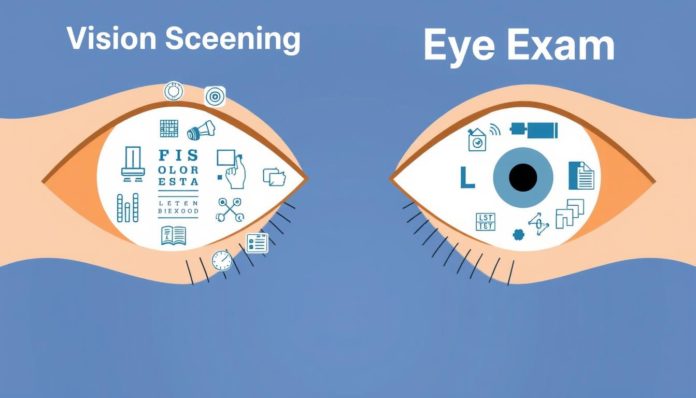Did you know that one in four children in the United States might have vision problems without being diagnosed? This fact shows how crucial it is to check vision regularly. But what’s the difference between a vision screening and an eye exam?
Vision screenings are simple tests done by doctors or school nurses to spot early vision issues. They’re not as detailed as eye exams. An eye exam by an optometrist or ophthalmologist looks deeper into eye health. It can find many eye conditions and check how well you see clearly.
Understanding Vision Screenings
A vision screening is a quick way to check for vision problems that might need more attention. It’s a key first step in keeping your eyes healthy. It helps spot issues that need a closer look.
Who Can Perform Vision Screenings?
School nurses, family doctors, and other trained healthcare workers do vision screenings. They look for eye problems early. If they find something, you might get a detailed eye check-up.

Types of Vision Screening Tests
There are different tests for vision screenings:
- Visual Acuity Testing: This checks how well you can see at different distances.
- Inspection of the Eye and Pupils: It looks for any eye issues.
- Photoscreening: Uses a camera to check for eye problems, especially in kids.
These tests are good for spotting vision problems early. But, if you have issues, you’ll need a more detailed eye check-up. An eye doctor can find problems that simple tests miss.
The Role of Eye Exams in Eye Health
Regular eye exams are key for keeping your eye health in top shape. Optometrists and ophthalmologists perform these thorough checks. They aim to spot problems early and keep your vision clear and sharp.

Components of a Comprehensive Eye Exam
A comprehensive eye examination covers several important steps:
- External Eye Inspection: The eye doctor looks at the overall shape of your eyes.
- Dilated Examinations: Drops make your pupils bigger, letting the doctor see the retina and optic nerve up close.
- Peripheral Vision Assessment: Tests check how well you see on the sides, helping spot glaucoma early.
- Eye Pressure Measurement: This measures the pressure in your eyes, a key sign of glaucoma.
Why Eye Exams Are Essential
Regular eye exams are vital for many reasons:
- They catch hereditary eye problems early.
- They spot issues like refractive errors, macular degeneration, and glaucoma.
- They are key to maintaining eye health, ensuring good vision up close and far away.
Adding eye exams to your health routine is a smart move. It helps protect your vision and prevents eye problems later on.
Common Conditions Detected by Eye Exams
Eye exams are key for keeping your eyes healthy. They help spot eye conditions early. This means you can get treatment fast to save your vision.
Age-related Macular Degeneration
Age-related Macular Degeneration (AMD) is a common eye issue. It affects your central vision, making everyday tasks hard. Eye exams can catch AMD early, helping to slow it down and keep your vision.
Glaucoma
Glaucoma is another eye disease found during exams. It happens when the eye pressure goes up, which can harm the optic nerve. If not caught early, it can lead to permanent vision loss. Spotting it early is key to managing it and keeping your eyes healthy.
Diabetic Retinopathy
Eye exams are also important for finding Diabetic Retinopathy. This is a diabetes complication that affects the retina. It’s a big cause of blindness in adults. Regular eye checks are crucial for catching it early and preventing serious vision problems.
When to Schedule Each: Vision Screening vs Eye Exam
Knowing when to schedule vision screenings versus eye exams is key for good vision care. Vision screenings are great for catching early vision problems, mainly in kids and sometimes in adults. They can be done in places like schools or during health check-ups to spot issues early.
A comprehensive eye exam is a deeper look at eye health by an eye care expert. It’s important to have these exams often for a full check of your vision and eye health. These exams can find vision problems and eye conditions that screenings might miss.
| Setting | Who Conducts It | Purpose | Frequency |
|---|---|---|---|
| Vision Screening | School Nurses, General Health Technicians | Identify early vision issues | Periodically, especially in schools |
| Comprehensive Eye Exam | Certified Eye Doctors | Detailed evaluation of eye health | As advised by an eye care professional |
In summary, knowing the difference between vision screenings and eye exams is vital for good vision care. Regular eye doctor visits help catch and treat vision problems early. This keeps your eyes healthy for a long time.
Vision Screening for Children
Keeping an eye on children’s vision is key for their growth. Early tests can spot problems that might change how they learn and see the world.
Early Detection of Eye Problems in Children
Spotting eye issues early can stop them from getting worse. Problems like lazy eye, crossed eyes, and vision errors are easier to fix if caught early. Regular checks help find these issues fast, so they can be treated right away.
Tools for Children’s Vision Screening
Many tools help check kids’ vision. Here are some:
- Eye Charts: Kids read letters or symbols from far away to test their vision.
- Matching Games: Young kids play games to check their vision if reading is hard.
- Devices Measuring Eye Reflection: Photoscreeners look for odd reflections in the retina, signaling vision problems.
While vision tests are helpful, they’re not enough on their own. A full eye exam gives a closer look at a child’s eye health. It finds issues that simple tests might miss.
Eye Exams for Seniors
As we get older, our vision needs more care. Regular eye exams are key for keeping our eyes healthy, especially for seniors. These exams help spot age-related conditions early, preventing damage and keeping our eyes healthy.
Importance of Regular Eye Exams for Seniors
For seniors, regular eye exams are a must. Many factors can affect vision in older adults, making yearly check-ups important. These exams help catch problems like cataracts and diabetic retinopathy early, allowing for timely treatment.
Common Eye Issues in Seniors
Seniors often face eye problems that can really affect their lives. Some common issues include:
- Cataracts: Clouding of the eye lens, leading to blurry vision.
- Glaucoma: Damage to the optic nerve due to increased eye pressure, potentially causing vision loss.
- Diabetic Retinopathy: Harm to the blood vessels in the retina, often due to long-term diabetes.
Keeping good vision in older adults means tackling these common issues with regular eye exams.
| Condition | Symptoms | Prevention/Management |
|---|---|---|
| Cataracts | Blurry vision, sensitivity to light | Eye surgery, protective eyewear |
| Glaucoma | Peripheral vision loss, halos around lights | Medications, laser treatment |
| Diabetic Retinopathy | Spots or dark strings in vision | Managing blood sugar, laser surgery |
Benefits and Limitations of Vision Screenings
Vision screenings have many advantages. They are easy to get at schools, community centers, and workplaces. This makes them accessible to many people. They are also quick and cheap, helping more people check for vision problems.
These screenings are great for catching early signs of vision issues in all ages. They’re especially useful for kids, helping spot problems early to improve learning. Adults can also benefit, getting early warnings for eye exams if needed.
But, it’s important to know what vision screenings can’t do. They don’t give a full check-up of eye health. They might miss subtle or complex issues that need a closer look from an eye doctor. So, serious conditions like glaucoma or diabetic retinopathy might not be caught.
Also, screenings don’t diagnose specific eye problems. They just help find who needs more tests. So, while they’re good for catching some issues early, they shouldn’t be the only check-up you get. They’re just a first step towards better eye care.
In conclusion, knowing what vision screenings can and can’t do helps us make better choices for our eye health. Regular check-ups and full eye exams should go hand in hand with screenings for the best eye care.
The Importance of Regular Vision Check-ups
Keeping your eyes healthy is key for everyone, no matter your age. Regular eye exams are vital for eye health. They help catch eye diseases early and make sure you can see well for everyday tasks.
- Early Detection: Vision check-ups spot problems like glaucoma, macular degeneration, and diabetic retinopathy early.
- Better Performance: Good vision is crucial for learning, working, and being with others.
- Customized Care: Regular exams mean you get treatments that fit your needs and can change your glasses or contacts if needed.
- Preventative Care: These check-ups help you take care of your eyes before problems start.
When to get your eyes checked depends on your age and health risks. Being proactive with eye care means you can see well and live better.
| Age | Recommendation |
|---|---|
| Children | First eye exam at 6 months, then at age 3, before starting school, and every year after. |
| Adults | Every 1-2 years, based on your health and risk factors. |
| Seniors | Every year, especially if you have diabetes or high blood pressure. |
Make sure to get your eyes checked regularly to protect your sight and improve your life.
Vision Screening vs Eye Exam: What’s the Difference?
Choosing between a vision screening and an eye exam is key to your vision health. They seem similar but have different goals and methods.
A vision screening is a quick, affordable check that shows if you need more tests. It’s often done in schools or health centers. It looks for vision problems early, especially in kids. But, it doesn’t diagnose specific eye conditions.
An eye exam, on the other hand, is a detailed check by an eye doctor. It can spot and treat eye problems like glaucoma, cataracts, and macular degeneration. This exam includes tests to check vision and eye health.
Choosing between a vision screening and an eye exam depends on your needs. Vision screenings are great for quick checks in places where many people need them. Eye exams are for a full check-up and managing eye health to catch and treat problems.
| Feature | Vision Screening | Eye Exam |
|---|---|---|
| Purpose | Identify potential vision issues | Diagnose and treat eye conditions |
| Professionals | Teachers, nurses, volunteers | Optometrists, ophthalmologists |
| Setting | Schools, community health centers | Clinics, specialized eye care centers |
| Scope | Basic vision checks | Comprehensive eye health evaluation |
How Often Should You Have an Eye Exam?
Knowing when to get your eyes checked is key for keeping your vision sharp and your health in check. The need for eye exams changes with age, risk factors, and current eye health. Kids need yearly exams to catch vision issues early, which helps with learning and growth.
Recommendations for Different Age Groups
Adults have different eye exam needs. People in their 20s and 30s should get a full eye check-up every two years. As you get older, you should go more often. Those 40 to 64 should visit every two years, and those 65 and up should go yearly.
Having a family history of eye problems, diabetes, or eye injuries means you might need to go more often. For more info, check out the American Academy of Ophthalmology’s eye exams page.
The Impact of Eye Health on Daily Living
Your vision greatly impacts your daily life. Bad vision can make driving, reading, working, and even seeing faces hard. Regular eye exams help catch issues like glaucoma or macular degeneration early.
This can keep your vision sharp and prevent bigger problems later. So, making eye exams a part of your health routine is a smart move.
FAQ
Who Can Perform Vision Screenings?
School nurses, family doctors, and healthcare pros can do Vision Screenings. They look for eye diseases early. These tests happen at schools or health check-ups.
What Types of Vision Screening Tests Are There?
Tests for Vision Screenings include checking how well you see, looking at your eyes, and photoscreening. These tests spot eye problems early but aren’t as detailed as full eye exams.
What Are the Components of a Comprehensive Eye Exam?
Optometrists or ophthalmologists do Comprehensive Eye Exams. They check your eyes outside, look at the inside with dilated eyes, and test your vision. They also check your eye pressure and how well you see up close and far.
Why Are Eye Exams Essential?
Eye Exams check your eye health closely. They spot serious eye problems like glaucoma and diabetic retinopathy early. This can stop eye diseases from getting worse with early treatment.
What Eye Conditions Can Eye Exams Detect?
Eye Exams can find eye diseases that hurt your vision if not treated. These include Age-related Macular Degeneration, Glaucoma, and Diabetic Retinopathy.
When Should I Schedule a Vision Screening vs an Eye Exam?
Use Vision Screenings for early vision checks, especially for kids and during health check-ups. Eye Exams are for regular checks based on your age, risk factors, and eye health.
Why Is Early Detection of Eye Problems in Children Important?
Catching eye problems early in kids helps with learning and growing. School vision screenings spot vision issues early.
What Tools Are Used for Children’s Vision Screening?
For kids, vision screenings use eye charts, matching images, and eye reflection devices. These tools check your vision and spot problems.
Why Are Regular Eye Exams Important for Seniors?
Eye exams for seniors catch age-related eye issues like cataracts and diabetic retinopathy. They help stop these diseases from getting worse and keep your vision.
What Are Common Eye Issues in Seniors?
Seniors often face cataracts, age-related macular degeneration, diabetic retinopathy, and glaucoma. Regular eye exams can manage these conditions well.
What Are the Benefits and Limitations of Vision Screenings?
Vision Screenings are easy to get and spot people needing eye care. But, they don’t fully check eye health and might miss some conditions. So, full eye exams are also important.
Why Are Regular Vision Check-ups Important?
Regular vision check-ups keep your eyes healthy and catch eye diseases early. They help everyone, kids and adults, see well for daily life, learning, and being with others.
How Often Should You Have an Eye Exam?
How often you need an Eye Exam depends on your age, risk factors, and eye health. Kids should get one every year. Adults might need them more or less based on their health.
How Does Eye Health Impact Daily Living?
Good eye health lets you do daily tasks safely and well. Eye exams keep your vision sharp and spot problems early. This means you can get help fast and keep your life quality high.


